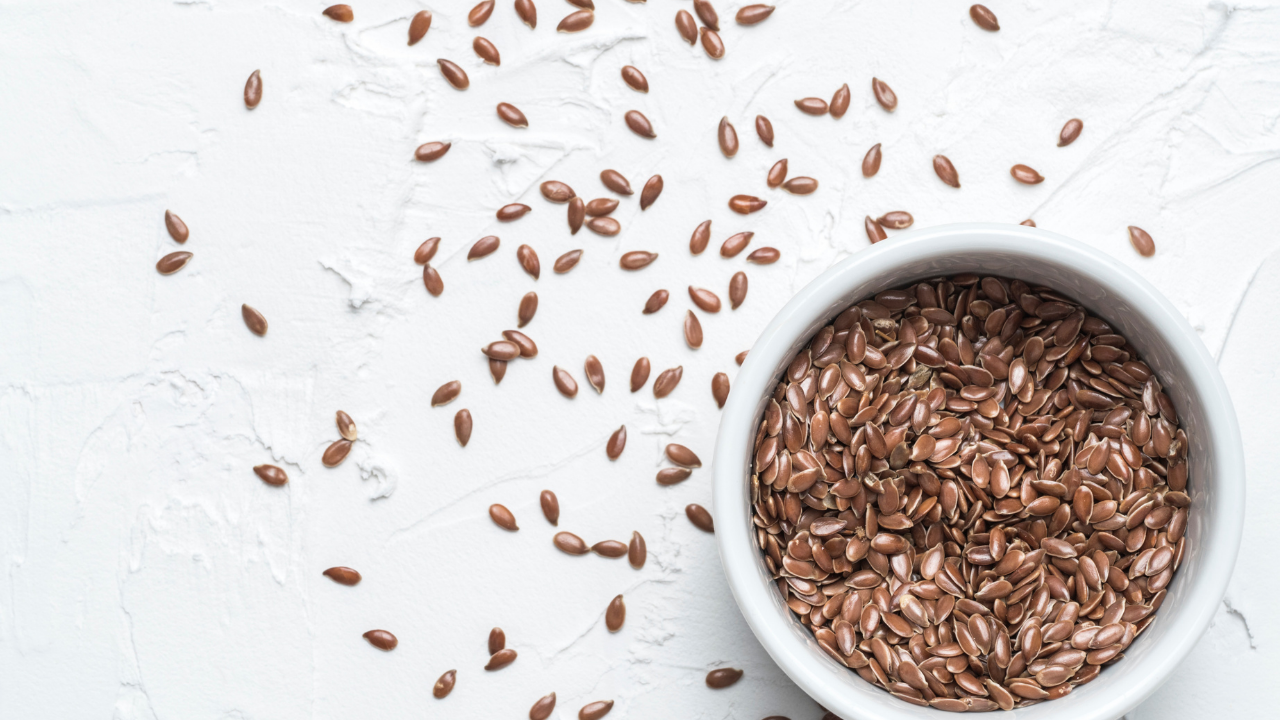|
Flaxseed (also known as linseed) can be ground into a flour called flax meal and cold-pressed into an oil. Flaxseed is one of the top anticancer foods due to the alpha-linolenic acid (ALA) it contains, which is a prime source of omega-3 fatty acids. ALA protects the kidneys from damage.
Flaxseed and flaxseed oil are easy ways you can get sufficient omega-3 without consuming fish, a vegan option. Having a sufficient amount of omega-3 in the body is good for the brain, which needs them to function. Flaxseed can help prevent the depressive moods that are a common symptom of a cancer diagnosis.[i] Flaxseed also contain lignans, a type of phytoestrogen that changes estrogen metabolism because it binds to some of the same receptors.[ii] Animal studies have shown that the lignans in flaxseed oil reduce breast cancer growth and spread.[iii] Cancer prevention studies of postmenopausal women showed that flaxseed supplementation improved the ratio of hormones in women’s bodies, making them less hospitable environments for cancer to occur.[iv] One study with mice shows it may work well alone or as an adjunct to Tamoxifen, a drug used to prevent breast cancer recurrence.[v] Flaxseed Is Especially Good For . . .
Cancer-Free woth Food Recipes with Flaxseed
Other Ways of Incorporating Flaxseed in Your Cancer-Healing Kitchen
Resources from Cancer-Free with Food book [i] A. Tanskanen,J.R. Hibbeln, J. Tuomilehto, et al. “Fish Consumption and Depressive Symptoms in the General Population in Finland,” Psychiatric Services, vol. 52, no. 4 (2001), pp. 529–31, https://www.ncbi.nlm.nih.gov/pubmed/11274502. [ii] A. Calado, P.M. Neves, T. Santos, et al. “The Effect of Flaxseed in Breast Cancer: A Literature Review,” Frontiers in Nutrition (February 27, 2018), https://www.frontiersin.org/articles/10.3389/fnut.2018.00004/full. Also: J. Lee, K. Cho. “Flaxseed Sprouts Induce Apoptosis and Inhibit Growth in MCF-7 and MDA-MB-231 Human Breast Cancer Cells,” In Vitro Cellular Development and Biology. Animal, vol. 48, no. 4 (2012), pp. 244–50, https://www.ncbi.nlm.nih.gov/pubmed/22438134. [iii] Ibid. [iv] “Flaxseed,” Memorial Sloan-Kettering Cancer Center (accessed June 26, 2018), https://www.mskcc.org/cancer-care/integrative-medicine/herbs/flaxseed. Also: L.U. Thompson, J.M. Chen, T. Li, et al. “Dietary Flaxseed Alters Tumor Biological Markers in Postmenopausal Breast Cancer,” Clinical Cancer Research, vol. 11, no. 10 (2005), pp. 3828–35, http://www.ncbi.nlm.nih.gov/pubmed/15897583. Also: S.E. McCann, L.U. Thompson, J. Nie, et al. “Dietary Lignan Intakes in Relation to Survival among Women with Breast Cancer: The Western New York Exposures and Breast Cancer (WEB) Study,” Breast Cancer Research and Treatment, vol. 122, no. 1 (July 2010), pp. 229–35, https://www.ncbi.nlm.nih.gov/pubmed/20033482. [v] J. Chen, K.A. Power, J. Mann, et al. “Flaxseed alone or in combination with tamoxifen inhibits MCF-7 breast tumor growth in ovariectomized athymic mice with high circulating levels of estrogen,” Experimental Biology and Medicine, vol. 232, no. 8 (September 2007), pp. 1071–80, https://www.ncbi.nlm.nih.gov/pubmed/17720953. [vi] “Flaxseed,” Memorial Sloan-Kettering Cancer Center. [vii] B. Liang, S. Wang, Y.J. Ye, et al. “Impact of Postoperative Omega-3 Fatty Acid-supplemented Parenteral Nutrition on Clinical Outcomes and Immunomodulations in Colorectal Cancer Patients,” World Journal of Gastroenterology, vol. 14, no. 15 (2008), pp. 2434–9, https://www.ncbi.nlm.nih.gov/pubmed/18416476. Also: C.H. MacLean, et al. “Effects of Omega-3 Fatty Acids on Cancer Risk,” JAMA, vol. 295, no. 4 (2006), pp. 403–15, http://www.ncbi.nlm.nih.gov/pubmed/16434631; and M.K. Sung, M. Lautens, L.U. Thompson. “Mammalian Lignans Inhibit the Growth of Estrogen-independent Human Colon Tumor Cells,” Anticancer Research, vol. 18, no. 3A (May–June 1998), pp. 1405–8, https://www.ncbi.nlm.nih.gov/pubmed/9673348. [viii] L.E. Rhodes, H. Shahbakhti, R.M. Azurdia, et al. “Effect of Eicosapentaenoic Acid, an Omega-3 Polyunsaturated Fatty Acid, on UVR-related Cancer Risk in Humans. An Assessment of Early Genotoxic Markers,” Carcinogenesis, vol. 24, no. 5 (May 2003), pp. 919–25, https://www.ncbi.nlm.nih.gov/pubmed/12771037. Also: L. Yan, J.A. Yee, D. Li, et al. “Dietary flaxseed supplementation and experimental metastasis of melanoma cells in mice,” Cancer Letters, vol. 124, no. 2 (February 1998), pp.181–6, http://www.ncbi.nlm.nih.gov/pubmed/9500208. [ix] W. Demark-Wahnefried, T.J. Polascik, S.L. George, et al. “Flaxseed Supplementation (not Dietary Fat Restriction) Reduces Prostate Cancer Proliferation Rates in Men Presurgery,” Cancer Epidemiology, Biomarkers, and Prevention, vol. 17, no. 12 (December 2008), pp. 3577–87, http://www.ncbi.nlm.nih.gov/pubmed/19064574. [x] “Flaxseed,” Memorial Sloan-Kettering Cancer Center.
0 Comments
Leave a Reply. |
by liana werner-grayHi. I am a Health researcher bringing you honest information about cancer healing treatments and foods that kill (and cause) cancer! I love diving into the scientific studies that show this research. Archives
December 2021
Categories |

 RSS Feed
RSS Feed
